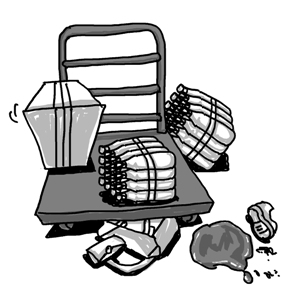Rules shouldn’t be made to be broken

Illustration: Lu Ting/GT
Last month, at a supermarket in Shanghai's Jiading district, a 66-year-old woman was struck and killed by an overloaded pushcart on an inclined moving walkway. The pushcart, which was brought into the supermarket by two customers, lacked the safety devices all supermarket trolleys have that automatically lock the wheels onto walkways. As 15 boxes of bottled water were loaded onto the cart, it plunged rapidly down the walkway after the men lost control of it.
A shocking detail of this case was the fact that not only are these carts forbidden to be used in the supermarket, but the security guard on duty noticed the cart beforehand. He tried to dissuade the men from taking the moving walkway, but after they insisted, the guard gave in, finally leading to the tragedy.
This is a classic case of rules being ignored and flouted, eventually leading to a tragedy that could so easily have been prevented. But I don't want to assign all the blame to the two customers who used the cart or to the security guard who let them in. The deeper problem lies in our society which lacks a basic respect for rules, whether it's a supermarket regulation or a national law.
A main reason is the lack of implementation of many laws and regulations in China. People who violate rules do not fear that they will need to pay a price for their transgressions. Chinese-style road crossing, a popular term that describes how Chinese people tend to ignore red lights when crossing a road, is an example. Although everyone knows it's against traffic regulations to jaywalk, few people are punished for it, and when there's no price to pay for a violation, the whole purpose of a rule, in this case, safety, is rendered moot.
In addition, following a rule is not considered a matter of pride in China. Many people think of rules as an obstacle to surmount rather than a positive social norm that can protect us from danger, chaos or unfairness, and moreover, contribute to the establishment of a lawful society. Hence, breaking a rule is regarded as a way to cut corners and save hassle. In this case, for example, the customers brought their own cart because they didn't want to bother moving the heavy water from a supermarket trolley to their own cart. Sadly, they didn't think of the possible consequences of their action.
Last but not least, the lack of clarity of many rules, or their poor design, only encourages people to defy them. A case in point is the security checks in Shanghai's metro stations. I see people walk past these security guards every day, ignoring their repetitive and unjustifiable assertions that passengers must undergo the security checks. It's hard not to ignore them, because the security check is so obviously useless. Why should backpacks be X-rayed and not handbags? Why are the security checks less strict during rush hour? Isn't the risk supposed to be higher when there are more passengers? In most stations, whether a piece of luggage gets X-rayed depends solely on how strict the staff are. These sorts of pointless, arbitrary rules are the worst kind; they only encourage people to become persistent rule-breakers.